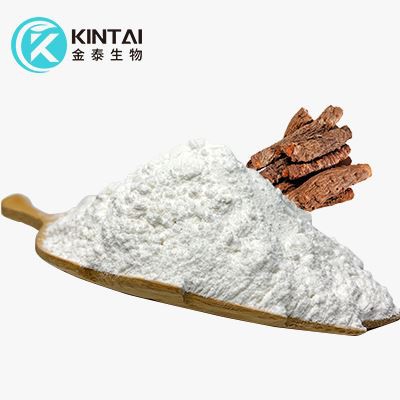kintaibio Sophora japonica extract quercetin powder- Bulk Ingredients For Supplements
The quercetin produced by KINTAIBIO relies on the independently developed high-speed countercurrent chromatography technology (HSCCC) to achieve efficient purification and large-scale production of quercetin powder, with a purity of more than 98% (UV detection), and the purity of some batches of products exceeds 99%. KINTAIBIO's product line covers nearly 3,000 natural product monomers, among which quercetin, as one of our core products, has been exported to 13 countries including Switzerland, Singapore, Thailand, and has passed multiple quality certifications.

Quercetin is widely found in plants such as the dried buds of Sophora japonica, onions, apple peels, and sea buckthorn. We mainly use Sophora japonica (unopened buds of Sophora japonica) as raw materials, which have a rutin content of up to 20%-30%, which can be efficiently converted into quercetin after hydrolysis. Raw material procurement strictly follows sustainable agricultural standards to ensure eco-friendliness.

Production process of quercetin powder
Alkali extraction and acid precipitation method
- Raw material pretreatment: Sophora japonica seeds are washed, dried and crushed to 60 mesh to remove impurities.
- Rutin extraction: Sodium hydroxide solution (pH 8-9) is used for extraction at 80℃ for 2 hours, filtered and acidified to pH 4-5 to precipitate crude rutin.
- Hydrolysis reaction: Rutin is heated to 90℃ in dilute sulfuric acid (1%-3%) for 3 hours to generate quercetin aglycone.
- Purification process: High-speed countercurrent chromatography (HSCCC) combined with macroporous resin adsorption technology is used to remove impurities such as pigments and polysaccharides to obtain high-purity quercetin.
Enzymatic hydrolysis (innovative process)
In view of the strong corrosion of traditional acid hydrolysis to equipment, our company has developed a β-glucosidase-catalyzed hydrolysis process. This technology can achieve the directional conversion of rutin to quercetin under mild conditions (pH 5.0, 45℃), with a 15% increase in yield, and avoid environmental pollution.

Quality Control System of quercetin powder
Testing Standards
The product strictly complies with the industry standard of "T/CCCMHPIE 1.30-2018 Plant Extract Quercetin". The main technical indicators include:
- Purity: ≥95% (HPLC test)
- Heavy metals: lead ≤5 ppm, arsenic ≤2 ppm
- Microorganisms: total colony count ≤1000 CFU/g, mold ≤100 CFU/g.
Analytical methods
- Structural identification: Nuclear magnetic resonance (1HNMR, 13CNMR) and mass spectrometry (MS) are used to confirm the molecular structure.
- Content determination: HPLC method (mobile phase: methanol-0.4% phosphoric acid aqueous solution, detection wavelength 370 nm).
Stability study
Through accelerated tests (40℃, RH 75%) and long-term tests (25℃, RH 60%), it was verified that quercetin can be stably stored for 2 years under light-proof and sealed conditions, and the degradation rate is <2%.
Application fields and market prospects of quercetin powder
Medical field
Chronic disease auxiliary treatment: Quercetin can reduce the risk of cardiovascular disease and improve insulin sensitivity in diabetic patients by inhibiting the PI3K/Akt signaling pathway (IC50 2.4-5.4 μM).
Anti-tumor research: Clinical trials have shown that quercetin can block the effects of androgens on prostate cancer cells, and its combination with 2-methoxyestradiol can inhibit tumor growth (tumor volume in mouse models decreased by 40%).

Functional food Antioxidant:
As a natural free radical scavenger, quercetin is widely used in beverages, oils and meat products to extend shelf life.

Dietary supplements:
Synergistic with vitamin C can enhance immunity, and the annual sales of related products in the US market increased by 33% (2021-2022).
Animal husbandry
Laying chicken production: Adding 50 mg/kg quercetin can increase egg production by 12% and reduce egg yolk cholesterol content by 15%.
Anti-stress application: Adding quercetin to the feed of weaned piglets can reduce the diarrhea rate by 30% and increase the abundance of beneficial intestinal bacteria (such as bifidobacteria) by 2 times.
Cosmetics
Quercetin is used in sunscreens and anti-aging essences due to its anti-inflammatory and anti-photoaging properties, and can inhibit UV-induced collagen degradation.
R&D Direction and Innovation
Nanoformulation Development: In view of the poor water solubility of quercetin (1 mg/L), liposome encapsulation technology is used to increase the bioavailability to 45%.
Glycoside derivative research: Explore the synergistic effect of derivatives such as quercetin-3-gentiobioside (CAS 7431-83-6) to enhance its antiviral activity.
Green synthesis process: Use microbial fermentation to produce quercetin precursors to reduce dependence on plant resources.

Safety and Compliance
Toxicological data: The oral LD50 of rats is 160 mg/kg, and the intravenous LD50 of mice is 18 mg/kg, which is a low-toxic substance.
Regulatory certification: Passed the new food raw material approval of the National Health Commission of China (2021), the US GRAS certification and the EU EFSA new food license (2017).
Social responsibility and sustainable development
Our company cooperates with seabuckthorn planting bases to extract quercetin from seabuckthorn pomace to achieve resource recycling. 5 kg of quercetin can be extracted from each ton of seabuckthorn pomace, reducing waste emissions by 80%.
Kintai manufacturing base


TIPS
If you want to purchase high-quality Pure Quercetin Powder, please feel free to contact us at sales@kintaibio.com or feedback in the next page.
Hot Tags: Quercetin Powder, China Quercetin Powder manufacturers, suppliers, factory








